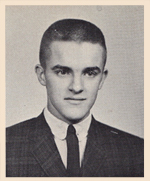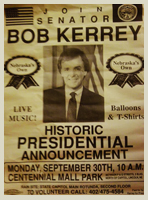Bob Kerrey believes that the solutions to the country’s toughest problems lie across party lines and that patriotism, not partisanship, is needed to address them. As a Senator, he will not be a reliable vote for any party caucus, nor will he withhold the truth about the country’s problems to curry political favor. This moment in history does not demand another partisan for either side. It demands a special kind of leader—one who understands not just the problems the country faces, as Kerrey certainly does from years of experience, but also the particular kind of leadership we need to solve them.
“If you want a candidate who will follow the dictates of his political party, I am not your man,” Kerrey says. “You are much more likely to find that in my opponent. For I believe that obedience to the demands of the Republican and Democratic caucuses have reduced the willingness of Senators of opposing parties to work with each other. And I believe this unwillingness is the single most important reason that so few of our most important national problems are not being solved.”
 Nebraska born and Nebraska bred, Kerrey has a national reputation as a leader eager to take on the toughest problems and unafraid to challenge party labels to do it. His service as Nebraska’s governor and U.S. Senator—interspersed with running his business in the private sector and serving as a university president—has drawn praise from across the political spectrum. He is, the respected columnist Mark Shields says, “a courageous maverick who has the guts to take a lonely stand against party bosses.”
Nebraska born and Nebraska bred, Kerrey has a national reputation as a leader eager to take on the toughest problems and unafraid to challenge party labels to do it. His service as Nebraska’s governor and U.S. Senator—interspersed with running his business in the private sector and serving as a university president—has drawn praise from across the political spectrum. He is, the respected columnist Mark Shields says, “a courageous maverick who has the guts to take a lonely stand against party bosses.”
Kerrey’s homecoming to run for the U.S. Senate seat he occupied for two terms was preceded by another, the memory of which motivates his public service today. Born in 1943 in Bryan Memorial Hospital, Kerrey was raised in Lincoln and studied pharmacy at the University of Nebraska. In 1966, he enlisted in the U.S. Navy and went on to volunteer for the elite Navy SEAL teams—the same commandos who recently conducted the raid of Osama bin Laden’s Pakistan compound. A combat wound sustained in Vietnam in 1969 forced the amputation of his right leg below the knee. After nearly a year recuperating in  the Philadelphia Naval Hospital, he made his first homecoming to Nebraska, returning to a community that embraced him and provided the support—medical, material and moral—that enabled him to put his life back together. Kerrey has since explained that he came to see the law—which built the hospital in which he recuperated and gave him a claim on other people’s income to finance his health care—less as a flashing light in the rear-view mirror telling people what not to do than as a beacon that could summon the nation to greatness in common endeavors.
the Philadelphia Naval Hospital, he made his first homecoming to Nebraska, returning to a community that embraced him and provided the support—medical, material and moral—that enabled him to put his life back together. Kerrey has since explained that he came to see the law—which built the hospital in which he recuperated and gave him a claim on other people’s income to finance his health care—less as a flashing light in the rear-view mirror telling people what not to do than as a beacon that could summon the nation to greatness in common endeavors.
With his brother-in-law Dean Rasmussen, he founded Grandmother’s in 1973, a business that eventually expanded to include other restaurants as well as Prairie Life health clubs, enterprises that over the years have employed thousands of Nebraskans. In 1982, a newcomer to electoral politics, Kerrey stunned pundits by winning election as Governor of Nebraska, an office in which he restored the state’s broken finances and helped to lead the revival of the Nebraska’s then devastated agricultural sector. He retired after one term to return to private life, then won election to the U.S. Senate in 1988. He was re-elected with broad bipartisan support in 1994, a year in which other Democrats were widely defeated.
 As Senator, he quickly gained a reputation as a maverick willing to challenge partisanship on both sides to tackle the toughest problems. He worked with Republicans like George H.W. Bush and Newt Gingrich to balance the budget and cut spending, and—with Republican Senator Jack Danforth—chaired the pioneering Bipartisan Commission on Entitlement and Tax Reform, which first called the nation’s attention to the still growing crisis of entitlement spending. Kerrey and Republican Congressman—now Senator—Rob Portman of Ohio led a nationwide investigation into IRS abuses that helped lead to groundbreaking reforms. In 1992, he ran for President of the United States in a campaign that first put the crisis of spiraling health care costs and uninsured Americans on the national agenda.
As Senator, he quickly gained a reputation as a maverick willing to challenge partisanship on both sides to tackle the toughest problems. He worked with Republicans like George H.W. Bush and Newt Gingrich to balance the budget and cut spending, and—with Republican Senator Jack Danforth—chaired the pioneering Bipartisan Commission on Entitlement and Tax Reform, which first called the nation’s attention to the still growing crisis of entitlement spending. Kerrey and Republican Congressman—now Senator—Rob Portman of Ohio led a nationwide investigation into IRS abuses that helped lead to groundbreaking reforms. In 1992, he ran for President of the United States in a campaign that first put the crisis of spiraling health care costs and uninsured Americans on the national agenda.
Kerrey also saw his job as a Senator as giving Nebraskans a seat at the table in writing laws to build a better Nebraska. Together, he helped Nebraskans reform the nation’s crop insurance system, add to the University of Nebraska’s world-class research capabilities and more. An early pioneer in the field of educational technology, he helped bring the Internet to schools and libraries across the state.
In 2000—with the federal budget in surplus and the nation paying down its debt—Kerrey decided to return once more to private life, accepting the Presidency of the New School University after completing his second term. His tenure at the New School was marked by the same insistence on reaching across ideological divides that had characterized his Senate service. Kerrey twice defied student protests to invite his Senate colleague John McCain, R-Arizona, to speak at the New School. Kerrey was also widely credited with placing the university’s finances on newly solid footing and leading a renewal of its reputation.
During his time at the New School, Kerrey continued to stay involved in public service. He was in New York City when terrorists struck the World Trade Center on September 11, 2001. He was tapped to serve on the National Commission on Terrorist Attacks Upon the United States and helped forge a unanimous, bipartisan report that detailed how 9/11 happened and led to reforms that have protected the nation since. Kerrey also served as chair of the College Board’s National Commission on Writing and, with Newt Gingrich, as head of the widely respected Alzheimer’s Study Group.
In 2012, with the problems he had addressed in the Senate—like the deficit and entitlements—once more growing out of control, Kerrey decided to make a second homecoming to run for the seat he once occupied. “America,” he said, “needs to step up its game.” His goal, Kerrey explained, is for Nebraskans to say at the end of the campaign: “He told us the truth.”
Kerrey’s campaign starts with the memory of his first homecoming, when he learned the importance of family, faith and community—and putting the law on the side of working Nebraskans. His agenda includes:
Repairing a dysfunctional Congress that has grown so mired in partisanship and institutional paralysis that it is incapable of solving the nation’s most pressing problems. He has proposed an array of reforms, including ending the Senate filibuster as we know it and requiring that presidential nominees—Republicans and Democrats alike—receive an up-or-down vote.
Keeping our promises to men and women in uniform and making sure they have the same degree of support that Kerrey had in his homecoming in 1969.
Reaching across party lines to address the twin crises of national debt and entitlement spending.
Solving the health care crisis by marrying a Republican idea—controlling costs—with the Democratic priority of ensuring access to care.
Growing the middle class through economic policies that give Nebraskans an opportunity to succeed and build long-term wealth. Kerrey will support tax policies that distribute burdens fairly. He will support trade deals that expand jobs for Nebraskans and oppose those that do not.
Keeping the nation safe, drawing on his experience on the 9/11 Commission and as Vice Chairman of the Senate Select Committee on Intelligence.
Protecting civil rights. Kerrey grew up in a world before Federal law made it a crime to discriminate in the workplace, in public and private facilities, and to restrict access to housing on the basis of race, ethnicity and gender. He remembers how appealing the arguments were to go slow because of the disruptive cost to businesses and taxpayers. The go-slow argument is always more appealing to those who are not affected by discrimination. “Some say that the long march of freedom for all is a part of a radical, liberal agenda. I disagree. Individual liberty and freedom of opportunity is a conservative idea connected to the original dreams and aspirations of our Founders. Any effort to pull the strand of freedom — for example of women to make their own health decisions or gay Americans to enjoy the same civil rights as all Americans — is a threat to the liberty of us all.”
 For Kerrey, this campaign is ultimately about a homecoming—not just his homecoming this year, but his homecoming in December 1969. It’s about character and community—about our obligations to one another—and, most of all, our obligations to generations to come. He is more than an experienced leader. He is the particular kind of leader this moment in history demands.
For Kerrey, this campaign is ultimately about a homecoming—not just his homecoming this year, but his homecoming in December 1969. It’s about character and community—about our obligations to one another—and, most of all, our obligations to generations to come. He is more than an experienced leader. He is the particular kind of leader this moment in history demands.

